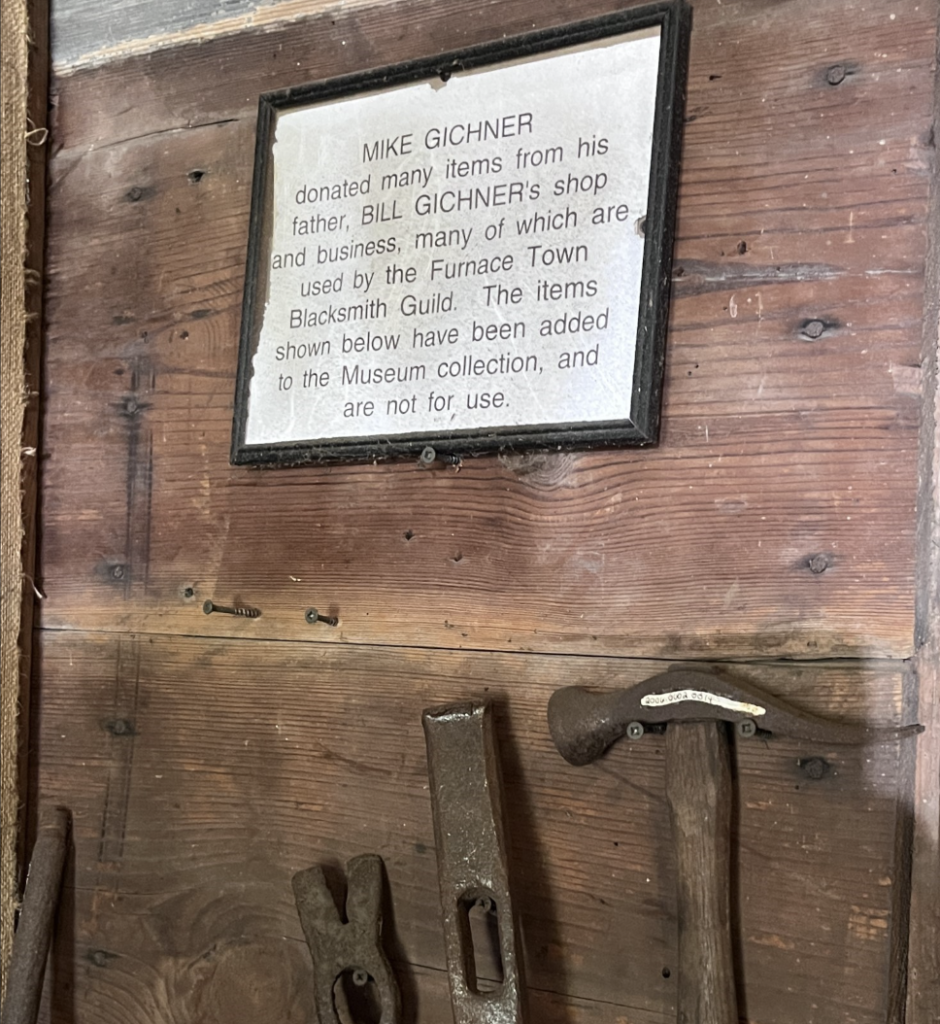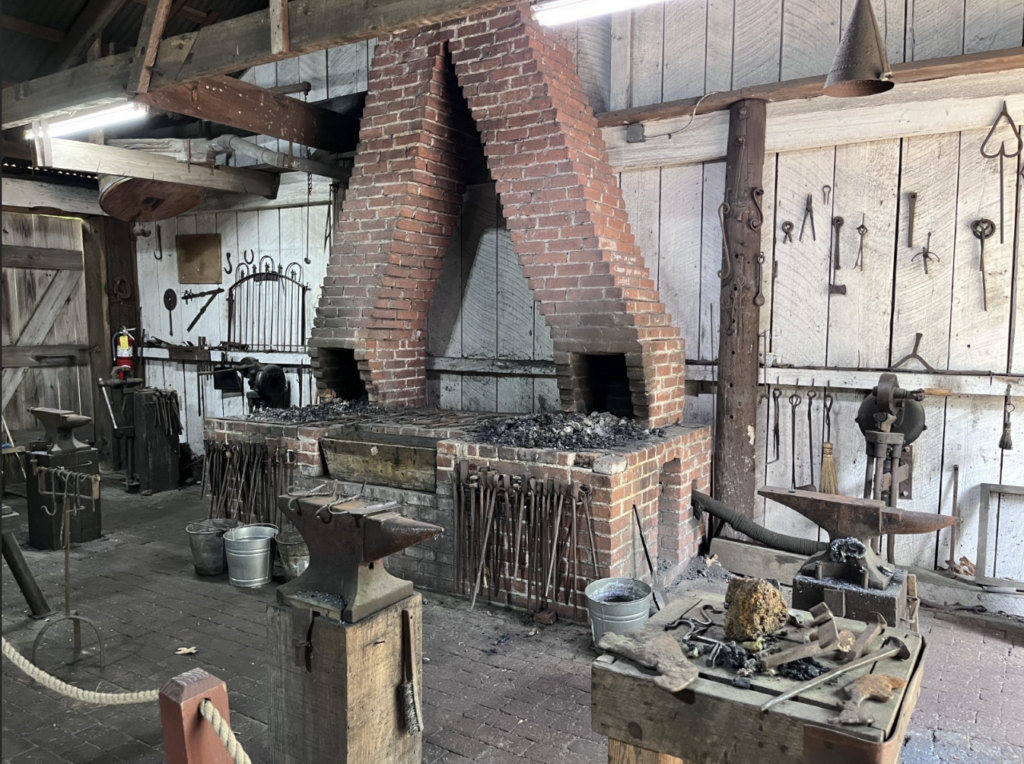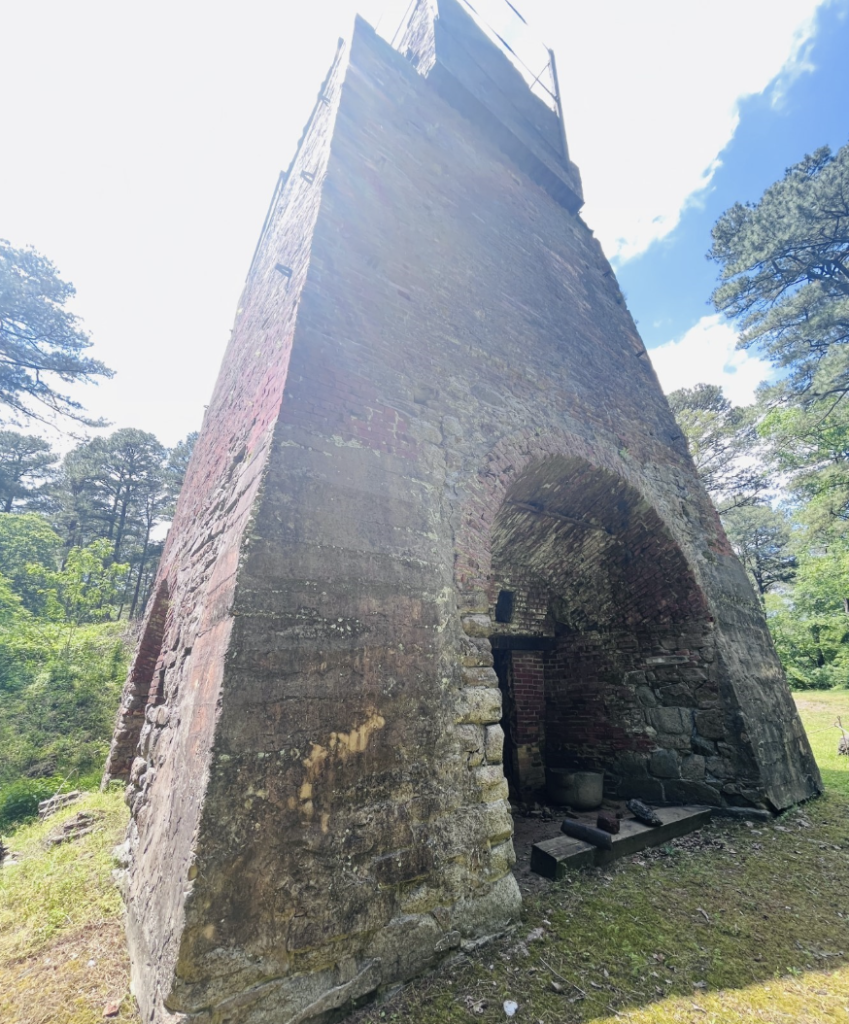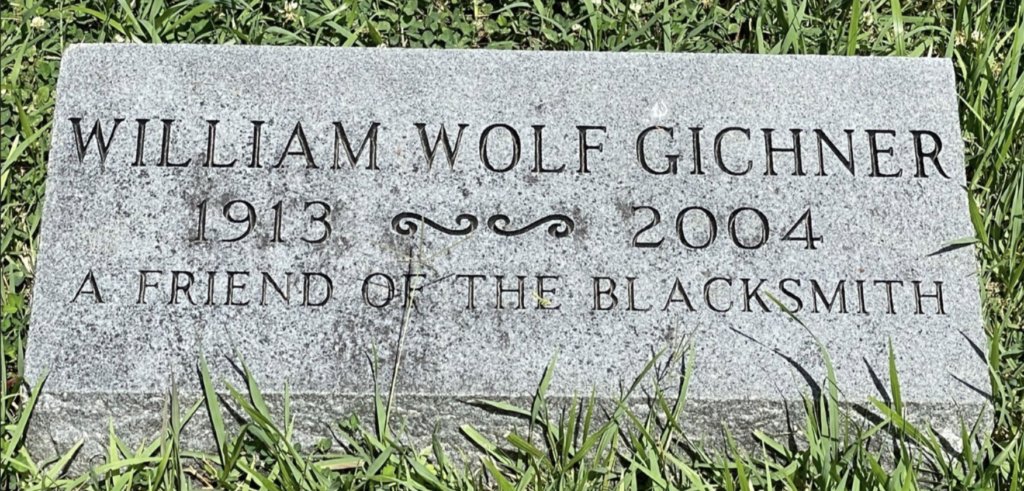The Whole Spiel
Gichner Iron Works
by Sarah, Leavitt, Curator
December 7, 2022
This past February, I started digging into the history of Maryland iron furnaces, a quest that has led us into the woods and next to streams in search of the towering brick structures I’d never noticed in the landscape before. To be honest, before February, I didn’t even realize that Maryland had much of an iron history. It all started with a zoom lecture for Black history month about an African American cemetery located behind the Museum of the Iron Worker, near Catoctin Mountain Park in Thurmont. The museum of what, now? Obviously, soon thereafter we were in the car, driving up to see the forge.

Employees of Gichner Iron Works gathered in front of the building at 1214-1216 D Street NW. / Capital Jewish Museum collection 2015.27.01. Gift of Nancy Colodny.
Thus began a months-long trek between iron forges, in which we learned about enslaved workers who tended the extremely (!) hot furnaces in the 1770s and the immigrant and Black communities that grew around the forges at various locations throughout the state. We learned that the iron forges were both necessary to early industrialization and war in the region, but also that Maryland iron was not exactly prized. The friendly staff at the Museum of the Iron Worker walked us through the steps of the process and the basics of the organization over several decades, which was nice because several other local forges have no interpretive signs at all.
But what does any of this have to do with local Jewish history? Imagine my delight when, one recent Saturday, after a several-hour drive, I walked into the education center at Furnace Town in Snow Hill, Maryland and saw a sign honoring the contributions of Bill Gichner. I know that name! I did my little “local Jewish history dance”–my family knows it well by now. It means, I’ve triumphantly made a connection between whatever seemingly unrelated thing we might be learning and a Washington Jewish historical personality or factoid. As the old summer camp song goes, “wherever you go, there’s always someone Jewish.”
So, who is Bill Gichner? At the Capital Jewish Museum, we have a collection of photographs that include some of Bill as a baby, as well as a wide variety of objects from his family’s iron works, and an oral history with his brother and sister-in-law.

Fred Gichner family at their home at 3220 Highland Place, NW. Back row: Tina and Fred Gichner. Front row: Bill, Henry, Hannah, Jacob. / Capital Jewish Museum collection 2006.36.1. Gift of John and Susan Rosenthal.
Bill Gichner’s father, Fred S. Gichner, was a Jewish immigrant from Austria who opened his first ornamental ironworks in DC in 1899. Gichner Ironworks went on to design fine ironwork grates, fences, and more for the White House, various embassies, and well-appointed homes all over town. By 1929 Gichner had 70 employees.

Anvil made by Gichner Ironworks, 1936. / Capital Jewish Museum collection, 2020.01.01. Gift of Carolyn Gichner.

Program from presentation of Army-Navy "E" Award to the employees of the Fred S. Gichner Iron Works. Includes the ceremony program, short history of the Iron Works, and short article, "The Significance of the E." April 16, 1943. / Capital Jewish Museum collection, 1995.02.13. Gift of Isabelle Gichner.
During World War II, when local construction was stalled, Gichner offered his company’s services to the war effort, for which he was awarded the Army Navy “E” for Excellence prize in 1943. The company was a stalwart throughout the mid-20th century, designing ornamental pieces for a rapidly growing and increasingly wealthy city. In 1965, to get more space for the studio, Gichner Iron Works, by then run by Fred’s son (Bill’s brother) Henry, moved out to Beltsville, Maryland. The firm’s output can be traced in part through research into the files at the DC History Center and the Library of Congress, which holds many of his architectural drawings for signage and other ornamentation around the city.

1876 Adas Israel Synagogue gate made by Gichner Ironworks. July 22, 1975. / Capital Jewish Museum collection, 1993.06.09. Gift of Peggy Brown.
One reason we love the Gichner Iron Works at CJM is that the company, as a tribute to Fred and his connections to the DC Jewish community, built the fence around our historic synagogue when it moved down the street in 1969. These Jewish stars in the ornamental fence let passers-by know that the Jewish Historical Society of Greater Washington would tell Jewish stories. We hope to restore a piece of the fence (now resting in storage) and include it in the landscaping of our new museum when we open in 2023.
But with all the accolades dished upon Fred Gichner at the museum, I had not known as much about the boy on his mother’s knee in the old photograph. And then we made a pilgrimage to Snow Hill, Maryland, location of Furnace Town, where I felt like I’d run into an old friend, albeit one I didn’t know that much about. I just get excited when I “meet” our Jewish Washingtonians out in the wider world.
William Wolf Gichner (1913-2004) was a renowned blacksmith and blacksmith history enthusiast. He worked for the family business for a while in DC but is best known in the iron artisan world for his 30-year “retirement” on the Delaware shore, from where he ran a store, Iron Age Antiques in Ocean View. The store had a blacksmith shop in the basement and a huge collection of books about ironworking, many of which now make up the Bill Gichner Collection in the library of the Metal Museum in Memphis. His son Michael donated much of the inventory from Iron Age Antiques to Furnace Town, a living history museum on the Eastern Shore dedicated to telling the story of the Nassawango Furnace (1830) and the unusual process of bog iron.

Photo of Furnace Town, Snow Hill, Maryland, taken by Sarah A. Leavitt

Photo of Furnace Town, Snow Hill, Maryland, taken by Sarah A. Leavitt.
Furnace Town includes an educational space where visitors can learn not only about the history of this particular iron forge and the local Nassawango Cypress Swamp, but also delve into the wonders of blacksmithing and artisan ironworking. The echoes of Gichner Iron Works are felt here, as Fred Gichner’s son and grandson have ensured the longevity of their craft through passing along these tools and knowledge to future generations.

Photo of Furnace Town, Snow Hill, Maryland, taken by Sarah A. Leavitt.

Photo of Furnace Town, Snow Hill, Maryland, taken by Sarah A. Leavitt.